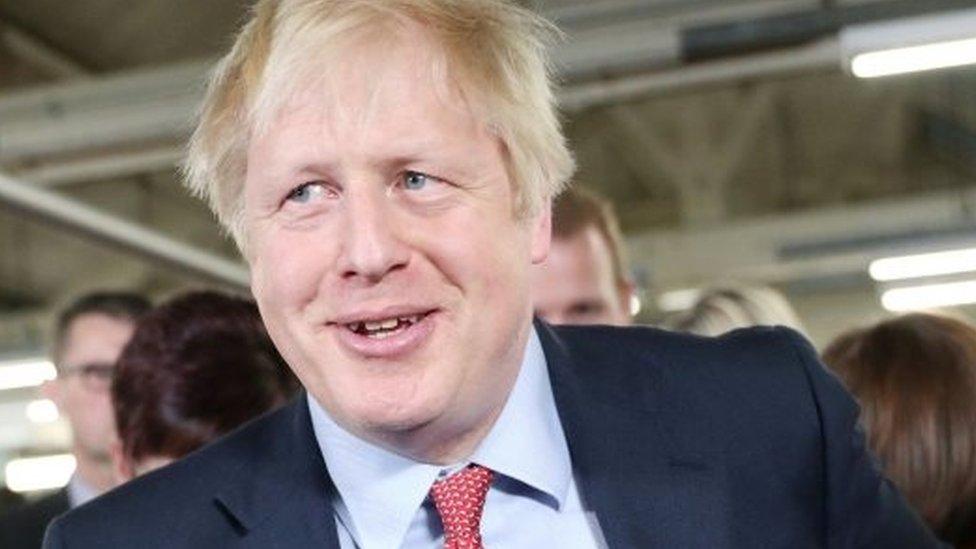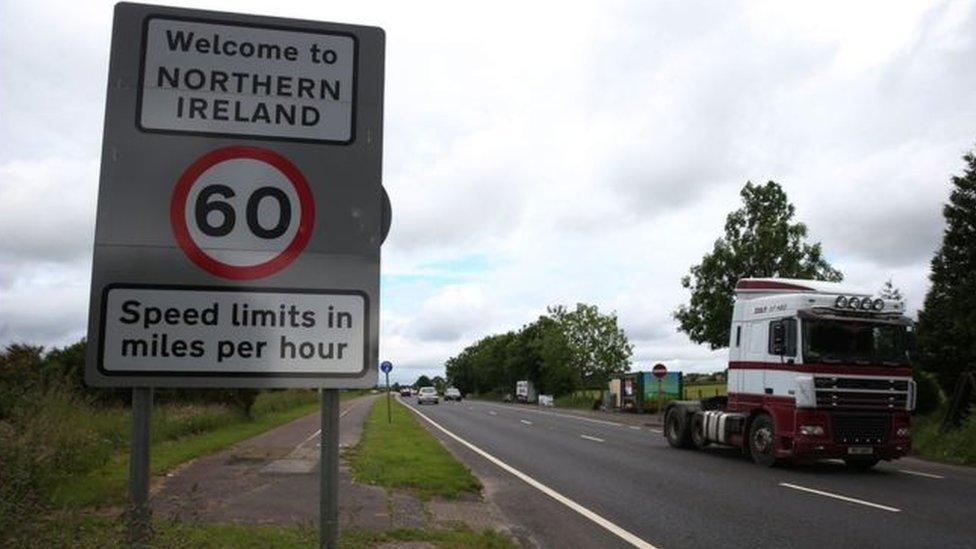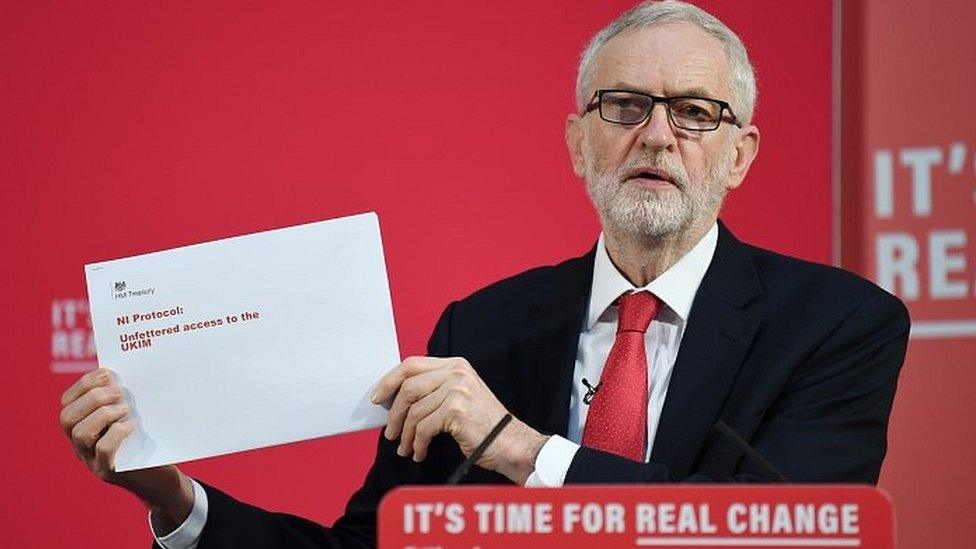General Election 2019: Johnson insists no NI-GB goods checks after Brexit
- Published

Boris Johnson has insisted there will not be any checks for goods travelling from Northern Ireland to Great Britain under his Brexit deal.
He told Sky News that a leaked Treasury analysis document was "wrong" to suggest this would be the case.
His Brexit deal means there will be goods checks from GB to NI, but there has been confusion on whether there will be checks in the other direction.
Labour said the PM's claims about his deal with the EU were "fraudulent".
And DUP leader Arlene Foster said she still had concerns over the withdrawal agreement Mr Johnson reached with other European leaders in October.
The comments come as the main political party leaders continue to push their pledges ahead of Thursday's general election.
Under the PM's agreement, Northern Ireland would continue to follow many EU rules on food and manufactured goods, while the rest of the UK would not.
Northern Ireland would also continue to follow EU customs rules but would remain part of the UK's customs territory.
Brandon Lewis: 'We are not going to have a border down the Irish sea'
A government risk assessment published in October said it would lead to new administration and checks on goods from west to east.
But Mr Johnson has insisted Northern Irish businesses will not be hit with additional paperwork or fees, telling a BBC phone-in during the election campaign: "We will make sure that businesses face no extra costs and no checks for stuff being exported from NI to GB."
He has said the only checks would be on British exports to the Republic of Ireland going via Northern Ireland.
But the BBC's Northern Ireland business and economics editor John Campbell said these comments "do not accurately reflect what is in the deal" and, because of EU law, products would have to be checked even if they were not going on to the Republic of Ireland.


Boris Johnson is right to say that under his Brexit deal goods travelling east - from Northern Ireland into Great Britain - would be treated differently from goods travelling west - from Great Britain into Northern Ireland.
But he's wrong to say there will no checks in either direction.
That assertion runs counter to what is written in his own withdrawal agreement.
Businesses sending goods from Northern Ireland into Great Britain will have to fill out export declaration forms - only a small piece of online bureaucracy, but still different from goods travelling elsewhere within the UK.
From Great Britain to Northern Ireland, though, tariffs will have to be paid on goods if their final destination is - or could be - the Republic of Ireland, inside the EU.
This will necessitate some form of checks. It's also important to remember that checks aren't just about customs.
Under the prime minister's deal, Northern Ireland will continue to follow many of the rules of the EU single market for goods. And that means EU law requires checks on, for example, all food and animal products - at their point of entry.
The more the UK diverges from EU rules, as Mr Johnson says he wants to be able to do, the more checks there will be.
The internal Treasury document leaked on Friday laid all this out in more detail. The prime minister says it is all nonsense, but his own deal says something rather different.

'No checks'
When asked on Sky News's Sophy Ridge on Sunday whether there would be checks, in light of the leaked Treasury document, Mr Johnson replied: "No, absolutely not.
"The deal we've done with the EU is a brilliant deal and it allows us to do all the things that Brexit was about, so it's about taking back control of our borders, money, laws.
"But unlike the previous arrangements, it allows the whole of the UK to come out of the EU, including Northern Ireland, and the only checks that there would be would be if something was coming from GB via Northern Ireland and was going on to the Republic, then there might be checks at the border into Northern Ireland."
Jeremy Corbyn reveals "secret" government Brexit report
Asked if the government's document was therefore wrong and if his Brexit secretary - who in October said goods going from Northern Ireland to Great Britain would be subject to exit declarations - was also wrong, Mr Johnson replied: "Yes.
"Because there's no question of there being checks on goods going from NI to GB or GB to NI, because they are part of - if you look at what the deal is, we're part of the same customs territory and it's very clear that there should be unfettered access between Northern Ireland and the rest of GB.
"The only reason - this is another of these things that has been produced by the Labour Party as a kind of distraction."
Giving evidence to the House of Lords Exiting the EU committee in October, Brexit Secretary Stephen Barclay initially said he did not believe exit forms would be necessary for trade between Northern Ireland and the rest of the UK.
But he later conceded: "The exit summary declarations will be required in terms of NI to GB."
When security minister Brandon Lewis was challenged on the subject of post-Brexit goods checks on the BBC's Andrew Marr Show, he said: "We have some checks now, with customs and live animals, things like that.
"It's right that we continue that. But we've been very clear - there will be no border down the Irish Sea.
"The UK as a whole will leave the European Union together and, of course, Northern Ireland itself will have that self-determination around things as we go forward."

DUP leader Ms Foster told BBC 5 live's Pienaar's Politics her party had a "large concern" about how it would be determined which goods travelling through Northern Ireland had the Irish Republic as the final destination.
"By definition you would need checks to see that that happens," she said. "There have been differing views even within the Conservative Party as to what it meant."
Ms Foster said there had to be "clarity in relation to that for those of us living in Northern Ireland, because, of course, Great Britain is our largest market by far, and we need to be able to, from an economic point of view, know what it's going to mean for us in the future".
At a press conference in London on Friday, Labour leader Jeremy Corbyn said the 15-page Treasury document - entitled Northern Ireland Protocol: Unfettered Access to the UK Internal Market - disproved Mr Johnson's claims there would be no checks, and showed his claims about his own deal were "fraudulent".
He said it was "hard evidence" NI would be "symbolically separated" from the rest of the UK after Brexit.
"What we have here is a confidential report by Johnson's own government, marked 'official', 'sensitive', that exposes the falsehoods that Boris Johnson has been putting forward," he said.
"This is cold, hard evidence that categorically shows the impact a damaging Brexit deal would have on large parts of our country, 15 pages that paint a damning picture of Johnson's deal on the issue of Northern Ireland in particular."
- Published6 December 2019
